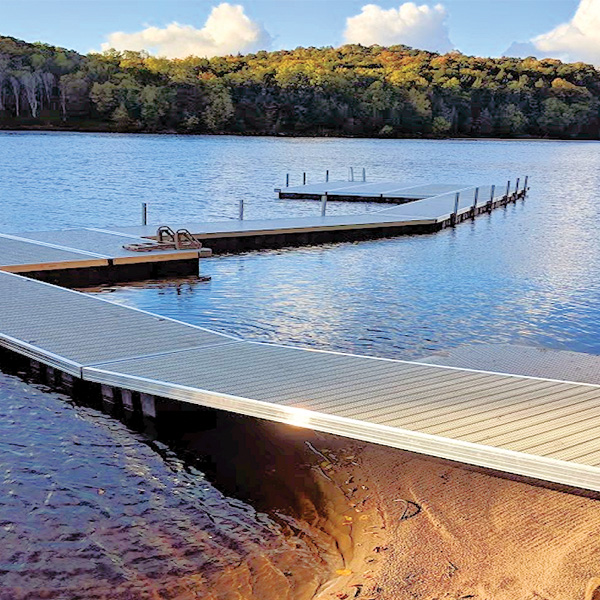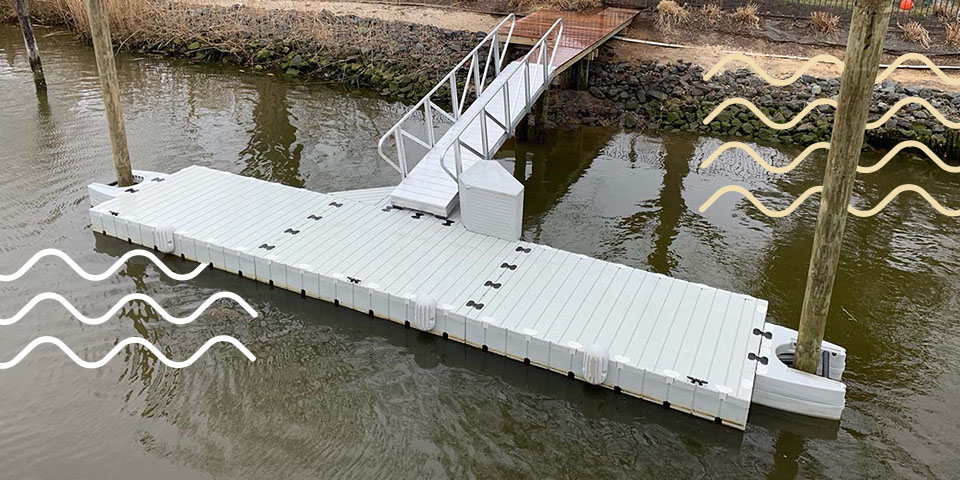Crafting Custom Solutions: Why a Floating Dock Builder is Important for Distinct Requirements
Crafting Custom Solutions: Why a Floating Dock Builder is Important for Distinct Requirements
Blog Article
Floating Docks: The Perfect Option for Versatile Water Accessibility
Floating docks present an engaging solution for a variety of water gain access to needs, providing convenience that transcends conventional mooring choices. Their capacity to adapt to rising and falling water degrees while making certain stability and safety makes them especially advantageous for both leisure and business applications. Furthermore, the modular nature of floating docks assists in customization, dealing with certain needs. Nonetheless, the subtleties of setup and upkeep, together with the series of applications, call for a closer assessment to completely appreciate their prospective benefits and effects for river gain access to strategies.
Benefits of Floating Docks
Floating docks deal countless advantages that boost water access for numerous applications. Their capability to drop and rise with transforming water levels makes them especially helpful in environments with rising and fall tides or seasonal variations. This versatility ensures that vessels can conveniently anchor without problem for the water's depth, providing a dependable platform for entertainment, industrial, and commercial uses.
In addition, floating docks are usually constructed from long lasting products that withstand deterioration, making them suitable for long-lasting usage in aquatic settings. Their installation is commonly less invasive than standard set docks, reducing the environmental effect and assisting in quicker deployment (floating dock builder). This versatility enables simpler relocation or reconfiguration according to user needs or ecological adjustments
Safety and security is one more crucial advantage; floating docks can offer steady gain access to for individuals boarding or disembarking from boats and reduce the risk of crashes related to unpredictable surface areas. They can be created to fit a variety of accessories, such as fenders and cleats, boosting performance. In general, floating docks represent an effective remedy for enhancing water gain access to across varied markets while promoting safety and ecological sustainability.

Kinds Of Floating Docks
Numerous types of floating docks deal with different demands and environments, each developed with details features to maximize functionality. The most typical kinds include modular docks, which are composed of interlacing sections that permit very easy personalization and expansion. These docks are ideal for recreational usage, as they can be customized to fit numerous boat sizes and water conditions.
An additional preferred option is the stationary floating dock, which stays secured in area but floats with altering water degrees. floating docks. This type is especially fit for locations with marginal tidal variations, providing stable gain access to for fishing or swimming. Furthermore, there are drive-on docks, which include a sloped layout that allows watercrafts to quickly drive on and off, making them appropriate for personal watercraft and smaller vessels
For industrial applications, durable floating docks are offered, built from strengthened materials to stand up to significant loads and harsh aquatic atmospheres. Finally, green floating docks make use of lasting products and layouts to lessen ecological effect, commonly including functions like plants to support local wildlife. Comprehending the various sorts of floating docks makes certain that customers can choose the most ideal option for their particular needs.
Installment Process Overview
An effective installation of floating docks calls for cautious preparation and interest to detail to make sure optimal efficiency and security. The initial step includes analyzing the site problems, including water depth, present, and possible obstacles. This analysis notifies the selection of the appropriate dock materials check out this site and design customized to the specific setting.
Following, obtaining essential permits is critical, as many territories have regulations regarding building and construction on water bodies. As soon as consents are secured, the installation can continue. Begin by preparing the structure, which may involve anchoring systems or pilings customized to the dock type and neighborhood problems.
Adhering to the structure configuration, put together the dock areas according to maker requirements. Make certain that all parts are securely fastened and aligned to endure ecological stresses. Placement the dock in the marked area, ensuring it is level and stable.

Maintenance Tips and Finest Practices
After the setup process is complete, continuous maintenance plays a vital duty in guaranteeing the longevity and performance of floating docks. Regular evaluations need to be carried out to identify any signs of damage, wear, or deterioration - floating dock services. Look for any loosened installations, fractures, or separation in the dock sections, as these can jeopardize architectural stability
Cleaning the dock is vital to remove particles, algae, and various other accumulation that can affect its appearance and security. Make use of a mild stress wash regularly to preserve sanitation without causing damage to the surface. In addition, using a safety sealer every couple of years can aid boost longevity and stand up to ecological wear.
Pay interest to the mooring lines and supports, guaranteeing they are secure and totally free from corrosion. Replace any type of abject parts promptly to prevent dangers. Seasonal modifications might also be essential; throughout severe weather, strengthening the dock click here to find out more or rearranging can prevent damages.
Applications for Floating Docks
Floating docks offer a plethora of applications, catering to both entertainment and commercial needs. In entertainment setups, they supply smooth access to waterways for activities such as boating, angling, and swimming. Their adjustable nature enables for installment in differing water degrees, making certain secure and steady accessibility regardless of tidal variations.
Commercially, floating docks are important for marinas and beachfront organizations. They help with the docking of vessels, enabling reliable packing and dumping of products. Their modular design enables for simple expansion or reconfiguration to accommodate transforming service demands, making them optimal for watercraft services, excursion procedures, or angling charters.
In addition, floating docks are used in ecological applications such as aquatic study and environment remediation. They can function as platforms for clinical researches, monitoring water quality, or conducting wildlife surveys without troubling delicate environments.
In commercial contexts, floating docks are used in building and construction jobs, providing access imp source to hard-to-reach areas for equipment and employees. Their convenience, durability, and very little effect on the environment make them an optimal option for a large range of applications, enhancing both functionality and accessibility in various water-based atmospheres.
Verdict
To conclude, floating docks represent an ideal solution for varied water accessibility requires, owing to their versatility, sturdiness, and modular style. These frameworks facilitate safe mooring for various applications while minimizing environmental effect throughout installation. The reduced maintenance requirements better improve their practicality. Floating docks offer as a useful property for entertainment, industrial, and ecological tasks, guaranteeing trustworthy accessibility to waterways and advertising sustainable methods in aquatic atmospheres.
Floating docks present an engaging solution for a variety of water accessibility requires, using versatility that transcends typical mooring options.Floating docks offer many advantages that enhance water gain access to for various applications. Overall, floating docks represent a reliable remedy for improving water access across varied fields while promoting safety and security and ecological sustainability.
Another prominent option is the stationary floating dock, which remains secured in location however floats with altering water degrees.In conclusion, floating docks represent an optimal service for diverse water access needs, owing to their versatility, sturdiness, and modular layout.
Report this page